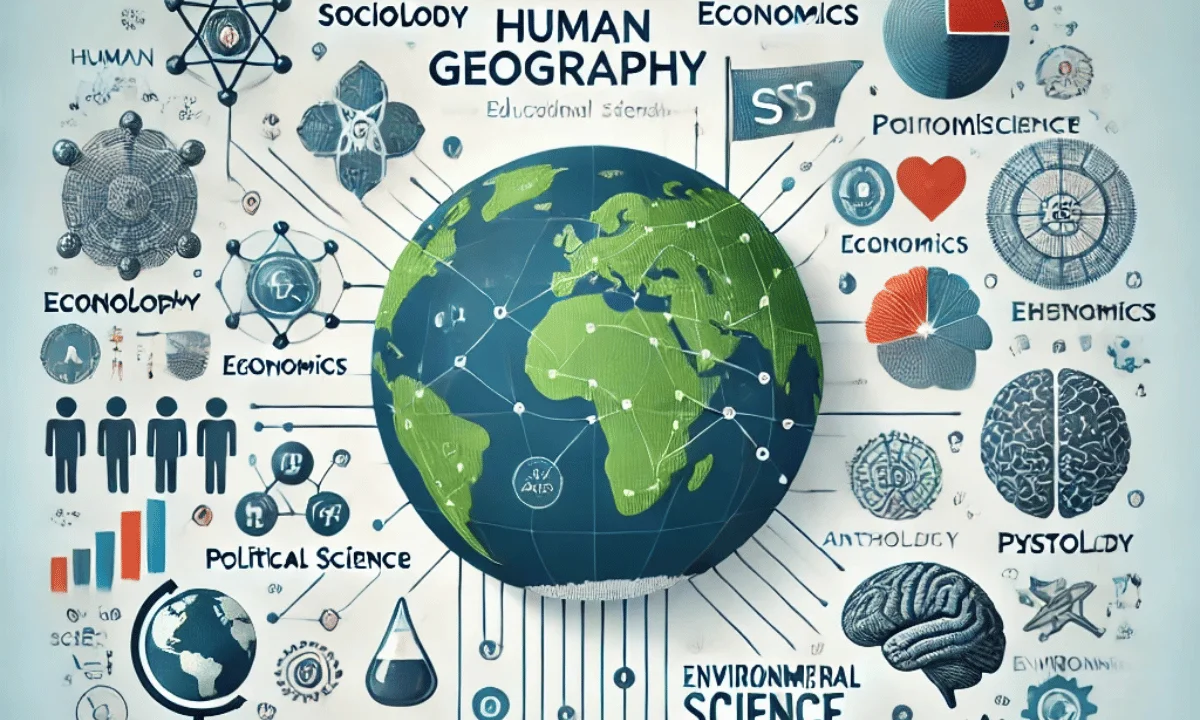Introduction
How is Human Geography Related to Other Social Sciences – Human geography is a branch of geography that focuses on the study of human activities, cultures, economies, and interactions with the environment. It examines spatial relationships and how humans influence and are influenced by their surroundings. As an interdisciplinary field, human geography shares strong connections with other social sciences, including sociology, economics, political science, anthropology, history, psychology, and environmental science.
This article explores the relationships between human geography and other social sciences, explaining how they interact to provide a deeper understanding of human societies and their environments.
Understanding Human Geography
Human geography investigates spatial patterns of human activity, population distributions, cultural landscapes, and economic systems. It also examines urbanization, migration, and human interactions with the physical environment. The field is divided into several sub-disciplines, including cultural geography, economic geography, political geography, and urban geography.
Geographers use qualitative and quantitative methods, such as field studies, geographic information systems (GIS), and spatial analysis, to understand how people interact with their environment. ( How is Human Geography Related to Other Social Sciences )
Relationship Between Human Geography and Other Social Sciences
1. Sociology and Human Geography
Sociology is the study of human society, social relationships, and institutions. Human geography and sociology overlap in various areas, including:
- Urban Studies: Both fields examine how cities grow, how people interact in urban settings, and how different social groups experience urban spaces.
- Social Stratification: Human geography analyzes spatial patterns of wealth, poverty, and social class, which are also central to sociology.
- Cultural Geography: Both disciplines explore social norms, traditions, and cultural diversity across different regions.
For example, sociologists and human geographers study migration patterns and how they shape societies and cultural landscapes.
2. Economics and Human Geography
Economics is the study of how societies allocate resources, produce goods, and distribute wealth. Economic geography, a subfield of human geography, overlaps with economics in areas such as:
- Trade and Globalization: Human geography analyzes global trade patterns, economic hubs, and the impact of globalization on different regions.
- Development and Regional Disparities: Both fields examine economic development, income inequality, and regional economic policies.
- Labor Markets: Economic geography studies employment trends, workforce distribution, and urbanization’s impact on economies.
For instance, economic geographers analyze how industrialization shapes regional economic growth and labor migration. ( How is Human Geography Related to Other Social Sciences )
Read More – WellHealth How to Build Muscle Tag
3. Political Science and Human Geography
Political science focuses on governance, policies, and political behavior. Political geography, a branch of human geography, examines:
- Territorial Boundaries and Geopolitics: Political geography studies international borders, conflicts, and geopolitical power structures.
- Electoral Geography: Human geographers analyze voting patterns, election districts, and the influence of demographics on politics.
- Public Policy and Urban Planning: Both fields explore how policies shape urban development, land use, and resource management.
For example, the study of Brexit’s impact on European trade and migration is a concern for both political scientists and human geographers.
4. Anthropology and Human Geography
Anthropology studies human cultures, societies, and their historical development. Human geography and anthropology are interconnected in:
- Cultural Landscapes: Both disciplines explore how human cultures shape landscapes and physical spaces.
- Ethnic and Indigenous Studies: Human geographers and anthropologists study indigenous land use, traditions, and social structures.
- Migration and Cultural Diffusion: Both fields analyze how cultural practices spread due to migration and globalization.
For example, anthropologists and human geographers examine how globalization affects traditional lifestyles and cultural heritage. ( How is Human Geography Related to Other Social Sciences )
5. History and Human Geography
History examines past events and their impact on societies. Human geography and history are related through:
- Historical Geography: Studies how geographical spaces and landscapes change over time due to historical events.
- Colonization and Trade Routes: Both fields analyze how colonialism shaped global trade and economic systems.
- Urban Development: Examines how cities evolved based on historical events and economic growth.
For example, historical geography investigates how the Silk Road influenced trade and cultural exchange between Asia and Europe.
6. Psychology and Human Geography
Psychology focuses on human behavior, cognition, and emotions. Human geography and psychology overlap in:
- Environmental Psychology: Studies how physical spaces affect mental health and well-being.
- Behavioral Geography: Examines how people perceive and navigate urban environments.
- Place Attachment: Explores emotional bonds between individuals and places.
For instance, behavioral geographers analyze how urban design influences stress levels and mental health in city dwellers. ( How is Human Geography Related to Other Social Sciences )
7. Environmental Science and Human Geography
Environmental science studies interactions between humans and their environment. Human geography is linked to environmental science in:
- Sustainability and Climate Change: Examines how human activities impact climate change and resource management.
- Disaster Management: Analyzes human responses to natural disasters and their spatial distribution.
- Urban and Rural Ecosystems: Studies the relationship between human settlements and environmental health.
For example, environmental geographers study how deforestation affects indigenous communities and global climate patterns.
Conclusion
Human geography is deeply interconnected with other social sciences, as it provides a spatial perspective on social, economic, political, and cultural processes. By integrating knowledge from sociology, economics, political science, anthropology, history, psychology, and environmental science, human geographers gain a comprehensive understanding of human societies and their environments.
This interdisciplinary approach helps address global challenges such as urbanization, migration, climate change, and economic development. By studying the relationships between human geography and social sciences, researchers and policymakers can make informed decisions that promote sustainable and inclusive development.
Understanding these interconnections allows us to appreciate the complexity of human societies and their ever-changing relationship with the world around them. ( How is Human Geography Related to Other Social Sciences )

1 thought on “How is Human Geography Related to Other Social Sciences?”